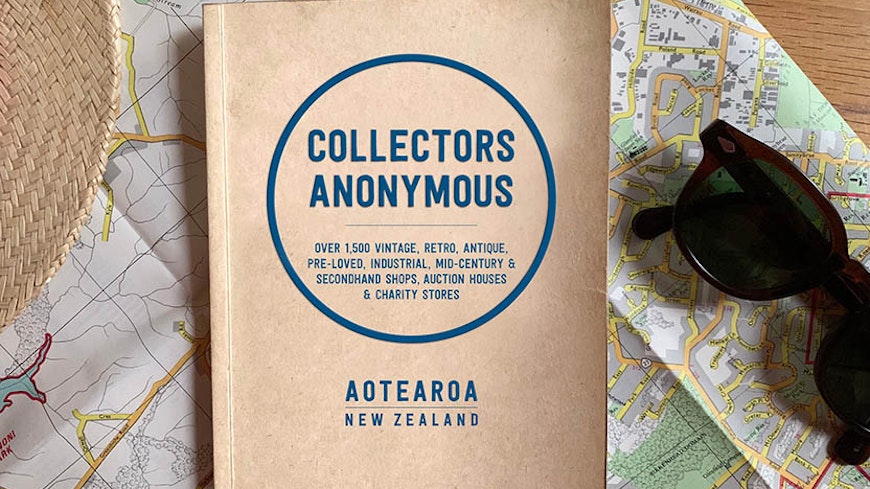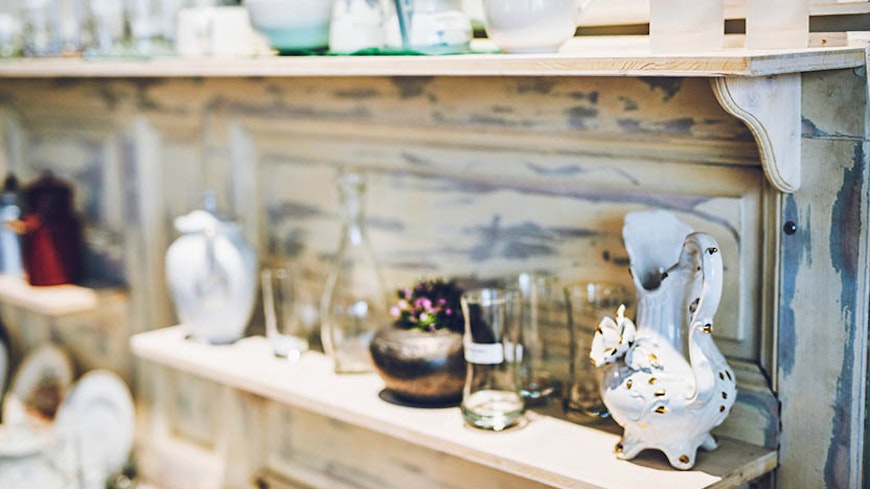Rose Jackson has visited more second-hand shops than you can shake a stick at. Her best buy? A mid-century sideboard cocktail cabinet for $20 from the Sallies in New Plymouth.

Jackson’s been a devotee of buying second-hand for 25 years and is the publisher of Collectors Anonymous, a directory of 1500 second-hand stores the length and breadth of the country. The book is now in its fourth edition.
She loves the treasure hunt of second-hand shopping: “You never know what you’re going to find.”
But the thrill of the hunt isn’t her main motivation. Time spent working in the UK fashion industry left Jackson “absolutely horrified” at the amount of waste created by fast-fashion and she didn’t want any part of it.
“It’s really important to try to stem the flow of goods going into landfill, use what we have and use goods for their entire life. Shopping second-hand you can get really good quality things that are made to last and you can get them at a really good price.”
Is there anything she wouldn’t buy second-hand? “Underwear.”
Op shop chic
Jackson is far from alone in opting for second-hand. Statistics NZ figures indicate sales revenue for the antique and second-hand trade jumped to $55.5 million in the three months to September 2020. That’s up 29 percent on the same quarter in 2018.

It’s a sign buying second-hand is shrugging off its second-rate image. Op shops used to be seen as “just old people’s stuff,” Jackson said. Items once sniffed at as relics of the past – think Crown Lynn pottery – have become sought-after commodities.
Mid-century modern furniture, with its clean lines and solid construction, has also been enjoying a renaissance. Big box furniture stores are even copying the designs. But whether their 21st century knock-offs will last the same distance as the originals remains to be seen.
It’s not just the aesthetics of retro chic or a nostalgia for New Zealand-made that’s behind the interest in second-hand. There’s also a discernible rise in consumers ditching shopping-as-usual and rejecting throw-away goods.
It’s a trend evident in our annual consumer survey, which asks Kiwis about their shopping habits and the issues that matter to them.
In this year’s survey, 50 percent rated environmental considerations as important and said they made an effort to look for “greener” products.
This sentiment is coupled with dissatisfaction about how long today’s goods last and doubts that companies are taking their environmental responsibilities seriously. Seventy-seven percent thought products don’t last as long as they used to, while two-thirds felt companies weren’t doing enough to reduce their environmental impacts.
There’s also scepticism about green claims. Just 44 percent thought green claims on products could be trusted, compared with 51 percent in our 2018 survey.
Environmental issues also featured among the top five concerns when we asked consumers what they were most worried about for the future. Climate change topped the list: 70 percent picked it as their key concern.
Consumer views
Second-hand economics
Second-hand markets aren’t a recent phenomenon by any means. For as long as we’ve been buying and selling goods, there’s been a second-hand trade turning over what others don’t want.

Op shops have been a mainstay of the modern market, often providing the only option for low-income shoppers, and helping to offset financial pressures from rising prices for other goods and services.
Historian Bronwyn Labrum traces the opening of op shops here back to the late 1920s, as the country headed into the Great Depression. They were run mainly by church groups to clothe the “needy”.
In the post-war years, antique shops earned their own cachet while the counter culture of the 60s and 70s saw second-hand become hip.
The market today ranges from charity shops staffed by volunteers to upmarket retro boutiques, many of which sell online as well. There are also plenty of private sellers using websites such as Trade Me to list pre-loved items.
Labrum and co-author Kerryn Pollock recount Trade Me’s dominance of the online market in the 2000s. In 2009, half of the items listed on the site were second-hand, they write.
While online sales may have dented the income of bricks and mortar stores, the recent resurgence in second-hand means they’re far from consigned to history.
When shopping, do you ...
Environmental benefits
Buying second-hand is now earning status as being central to the “circular economy”, the latest buzzword in political discussions about changing the way we produce goods and forestalling worsening environmental problems.
Seasoned second-hand shoppers may have twigged to the environmental benefits long ago.
The reduction in environmental costs from buying second-hand can be significant. By one estimate, the energy used to collect and sell second-hand clothing is 10 to 20 times less than making garments new.
There are also significant advantages for your wallet.

Charity shops are still one of the best options for budget buys – though don’t be surprised if you find collectors’ items priced at a premium even at these stores. They’ve become wiser to the value of vintage offerings.
Professional traders have also muscled in, nabbing stock that would once have been sold at charity shops. However, for common household items, plenty of savings can still be had.
Buying second-hand doesn’t mean you’re on your own if the product turns out to be faulty. The Consumer Guarantees Act covers second-hand goods you buy from a trader, not just items bought from mainstream stores.
Jackson’s top tip for getting a bargain: be prepared to dig.
“It’s not like a mall and things aren’t going to be really easily displayed for you. You’ll be rewarded with treasure if you go digging.”
But don’t go overboard.
“Even if you’re buying second-hand, you don’t want to over-buy.” To reuse an old saying, it’s not a bargain if you don’t need it.
Thinking ahead, how concerned are you about the following issues?
Stay in the know
Keep up-to-date with Consumer's latest news, investigations and product and service reviews, plus join the Consumer panel with invitations to take part in surveys.